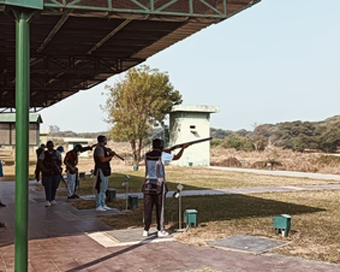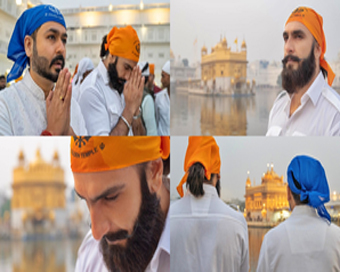 PM Modi visit USA
PM Modi visit USA Only the mirror in my washroom and phone gallery see the crazy me : Sara Khan
Only the mirror in my washroom and phone gallery see the crazy me : Sara Khan Karnataka rain fury: Photos of flooded streets, uprooted trees
Karnataka rain fury: Photos of flooded streets, uprooted trees Cannes 2022: Deepika Padukone stuns at the French Riviera in Sabyasachi outfit
Cannes 2022: Deepika Padukone stuns at the French Riviera in Sabyasachi outfit Ranbir Kapoor And Alia Bhatt's Wedding Pics - Sealed With A Kiss
Ranbir Kapoor And Alia Bhatt's Wedding Pics - Sealed With A Kiss Oscars 2022: Every Academy Award Winner
Oscars 2022: Every Academy Award Winner Shane Warne (1969-2022): Australian cricket legend's life in pictures
Shane Warne (1969-2022): Australian cricket legend's life in pictures Photos: What Russia's invasion of Ukraine looks like on the ground
Photos: What Russia's invasion of Ukraine looks like on the ground Lata Mangeshkar (1929-2022): A pictorial tribute to the 'Nightingale of India'
Lata Mangeshkar (1929-2022): A pictorial tribute to the 'Nightingale of India' PM Modi unveils 216-feet tall Statue of Equality in Hyderabad (PHOTOS)
PM Modi unveils 216-feet tall Statue of Equality in Hyderabad (PHOTOS)India Open Competition in Shotgun, organised by the National Rifle Association of India (N
- Hockey India names Amir Ali-led 20-man team for Junior Asia Cup
- Harmanpreet Singh named FIH Player of the Year, PR Sreejesh gets best goalkeeper award
- World Boxing medallist Gaurav Bidhuri to flag off 'Delhi Against Drugs' movement on Nov 17
- U23 World Wrestling Championship: Chirag Chikkara wins gold as India end campaign with nine medals
- FIFA president Infantino confirms at least 9 African teams for the 2026 World Cup
Bengal assembly to pass anti-CAA resolution: Mamata Last Updated : 21 Jan 2020 05:02:16 AM IST 
West Bengal Chief Minister and TMC supremo Mamata Banerjee (file photo) The West Bengal government is planning to pass a resolution in the state Assembly against the Citizenship (Amendment) Act in the next three-four days, Chief Minister Mamata Banerjee said on Monday and demanded that the provision seeking the birth certificates and parents place of birth be deleted from the NPR form.
She also appealed to the north eastern states not to participate in the National Population Register (NPR) exercise.
"We have also passed a resolution against National Register of Citizens (NRC) three months ago. We will pass a resolution against CAA also within three-four days," Banerjee told mediapersons.
The CPI(M)-led Left Democratic Front (LDF) government in Kerala and Congress ruled Punjab have already passed resolutions in the respective state assemblies demanding scrapping of the controversial CAA.
Referring to the NPR, Banerjee pointed out that the form has a column seeking aA birth certificates and place of birth of parents.
"But now they (central government) are saying it is not mandatory. If it's not mandatory, you withdraw. Why will it exist in the form?" he said.
"So there is an apprehension. First they have to withdraw all these clauses, all these conditions," she said.
Banerjee requested the north eastern states and their chief ministers to go through the law carefully before taking any decision about NPR.
"Because in the name of so-called NPR, there are so many conditions, related to NRC. And I will request them not to participate in this matter, because the conditions are very bad," she said.
The CAA, passed in the Parliament last month, seeks to provide Indian nationality to Hindus, Christians, Sikhs, Parsis, Jains and Buddhists fleeing persecution in Pakistan, Afghanistan and Bangladesh before December 31, 2014.
As per the Act, such communities will not be treated as illegal immigrants now and will be given Indian citizenship.
The legislation, which has come into force on January 10, has led to countrywide protests, with students coming out on the streets in thousands in almost all the states. Civil society members, anti-BJP political parties and commoners have also joined the protests.
The north-eastern states, including Assam, have been on the boil, amid fear among indigenous communities that the law could give recognition to lakhs of immigrants who came from Bangladesh over the decades.IANS Kolkata For Latest Updates Please-
Join us on
Follow us on








172.31.16.186







